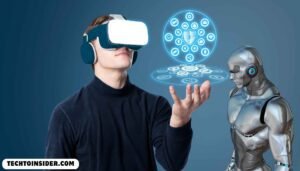Practical Quantum Application Development
Introduction
Practical Quantum Application Development stands at the forefront of this transformative movement. This article is your guide into the captivating world of quantum computing, exploring how it is being applied practically in diverse sectors. Also Check Can Quantum Computers Be Used For Gaming
What Is Mean Practical Quantum Application Development?
Quantum app development is like making special computer programs that use tiny particles and energy rules from quantum physics. Quantum physics is a type of science that studies how really small things, like atoms and tiny particles, behave. In the world of quantum computing, we use special bits called qubits instead of regular bits.
Regular computers use bits that can only be 0 or 1 to do their work. But quantum computers use qubits, and these can be 0, 1, or both at the same time! This is possible because of something called superposition. This unique ability of qubits helps quantum computers solve certain problems much faster than regular computers can.
So, in simple words, quantum app development is about creating programs for computers that follow the cool rules of quantum physics, using these special qubits to do computations in a super-efficient way.
Types of Practical Quantum Application Development Models
- Quantum Annealing:
- Solves optimization problems by finding the best solution among many possibilities.
- Gate-Based Quantum Computing:
- Uses quantum gates to process information, offering versatility for various problems.
- Adiabatic Quantum Computing:
- Gradually transforms and simplifies problems for easier solving, then reverses the process.
- Quantum Machine Learning:
- Combines quantum computing with machine learning for improved data analysis and pattern recognition.
- Quantum Cloud Computing:
- Connects quantum computers to the cloud, allowing remote access to quantum computing power.
Harnessing Quantum Power
What is Quantum Computing?
Quantum computing is a revolutionary field within computer science that harnesses the principles of quantum mechanics for processing information. Unlike classical computers that use traditional binary bits (0s and 1s), quantum computers utilize quantum bits or qubits. What sets qubits apart is their ability to exist in multiple states simultaneously. This remarkable trait empowers quantum computers to solve complex problems with unparalleled efficiency and speed.
The Promise of Quantum Supremacy
Quantum supremacy, a term coined by renowned physicist John Preskill, refers to the point at which quantum computers outperform classical computers in specific tasks. Achieving quantum supremacy is a pivotal milestone in the realm of quantum application development, bringing us closer to unlocking the true potential of quantum computing.
Practical Quantum Application Development
Quantum computing is not just a technological marvel; it’s a game-changer with transformative solutions that resonate across diverse industries. Here’s an exploration of quantum computing’s practical applications and its impact on various sectors:
Quantum Leap in Drug Discovery
In the pharmaceutical realm, the quest for new drugs is both time-consuming and expensive. Quantum computers, however, redefine the game by simulating molecular interactions. This accelerates drug discovery, drastically reducing the time needed to identify potential candidates. The implications? A revolutionary approach to healthcare that holds the promise of saving lives.
Material Science Redefined
Industries like aerospace and renewable energy demand advanced materials with specific properties. Quantum computing emerges as a key player in designing these materials, elevating characteristics like strength, lightness, and conductivity. This breakthrough extends its influence to critical areas such as battery technology, solar cells, and catalysis, fostering sustainable innovation.
Financial Precision Through Quantum Modeling
In the financial sector, precision is paramount. Quantum computing steps in by enhancing financial models, adeptly handling complex market data and optimizing investment strategies. The result? More secure and efficient financial markets, leaving a profound impact on global economies.
Quantum Machine Learning: Revolutionizing the Norm
Quantum algorithms are reshaping the landscape of machine learning. Leveraging the unparalleled processing power of quantum computing, these algorithms elevate tasks like image recognition, natural language processing, and fraud detection. The outcome is faster, more accurate decision-making across various industries.
Navigating Urban Labyrinths: Quantum Traffic Management
Urban congestion poses persistent challenges, affecting both the environment and quality of life. Quantum applications come to the rescue by optimizing traffic flow. Real-time analysis of vast datasets enables the reduction of congestion and the enhancement of transportation systems, paving the way for greener, more efficient cities.
Precision in Weather Predictions
Accurate weather predictions are indispensable for disaster preparedness and resource allocation. Quantum computing processes extensive weather data, providing precise forecasts. This technological advancement enhances our ability to respond to natural disasters effectively and manage resources with utmost precision.
Quantum Support in Space Exploration
Quantum algorithms play a pivotal role in supporting space exploration missions. By solving complex trajectory optimization problems, these algorithms enable space agencies to plan missions more efficiently, unlocking new frontiers in our exploration of space.
Quantum Healing in Medicine
In the realm of medical research, quantum computing proves to be a valuable ally. Modeling intricate biological systems, it facilitates breakthroughs in understanding diseases and drug interactions. The potential? Improved diagnostics and treatments that can redefine the landscape of healthcare.
Quantum Cryptography: Unbreakable Security
Quantum cryptography is a groundbreaking field that leverages the unique properties of quantum mechanics to create unbreakable encryption. This innovation has far-reaching implications for industries that rely on secure communications, such as banking and government agencies. However With the implementation of quantum key distribution, potential eavesdroppers are left with virtually no chance to intercept or decipher encrypted messages.
- The Basics of Quantum Key Distribution (QKD): Explain the fundamental concept of QKD, which is the cornerstone of quantum cryptography. Highlight how QKD enables the secure exchange of cryptographic keys between two parties.
- Quantum Entanglement: Discuss the role of quantum entanglement in QKD. Explain how the entangled properties of quantum particles can be harnessed to ensure the security of the key exchange.
- Security Benefits: Emphasize the key security benefits of quantum cryptography. Such as its resistance to eavesdropping, thanks to the no-cloning theorem and the principles of quantum uncertainty.
- Current Quantum Cryptography Technologies: Provide an overview of the existing quantum cryptography technologies. Also protocols, including BBM92, E91, and others.
- Practical Implementation Challenges: Acknowledge the challenges associated with implementing quantum cryptography in real-world applications. Including the need for specialized hardware and quantum-safe encryption algorithms.
Drug Discovery: Accelerating Research
In the pharmaceutical industry, quantum computing has emerged as a catalyst for accelerating drug discovery processes. Also Quantum computers simulate molecular interactions with remarkable precision and speed. Researchers can efficiently analyze vast datasets and complex molecular structures, drastically reducing the time and costs associated with developing new drugs.
- Quantum Simulations for Molecular Modeling: Quantum computers can simulate molecular structures with high precision, aiding in the discovery of new drug candidates and understanding their interactions with biological targets.
- Improved Drug Screening: Quantum algorithms can enhance the efficiency of virtual drug screening, enabling researchers to identify potential compounds more rapidly and accurately.
- Optimizing Chemical Reactions: Quantum computing can optimize chemical reactions, leading to the development of more efficient synthesis pathways for drug compounds.
- Machine Learning in Drug Discovery: Quantum computing can accelerate machine learning models used in drug discovery, improving predictive analytics and target identification.
- Quantum Chemistry Simulators: Specialized quantum chemistry simulators can provide insights into the electronic structure of molecules, allowing for better-designed drugs with specific properties.
Weather Forecasting: Precision and Timeliness
The vast processing power of quantum computing is harnessed for highly accurate and timely weather forecasting. However This capability is invaluable for disaster preparedness and agriculture, where precise weather predictions can save lives and optimize resource allocation. Quantum computers process an enormous volume of data, allowing for more accurate and timely forecasts.
- Challenges in Weather Forecasting: Discuss the existing challenges and limitations of classical weather forecasting methods, such as complex mathematical models and the need for vast computational power.
- Quantum Computing’s Potential: Explore how quantum computing can address some of these challenges by leveraging its unique properties, such as superposition and entanglement, to perform complex weather simulations more efficiently.
- Quantum Algorithms for Weather Modeling: Introduce specific quantum algorithms, like quantum annealing or quantum phase estimation, that can be applied to weather modeling and prediction.
- Hybrid Quantum-Classical Approaches: Also Discuss the concept of hybrid quantum-classical algorithms, where quantum processors work in conjunction with classical computers to enhance the accuracy and speed of weather forecasting.
- Data Processing and Analysis: Explain how quantum computing can expedite the processing and analysis of vast amounts of weather data collected from satellites, sensors, and other sources.
Supply Chain Optimization: Efficiency and Sustainability
The logistics industry is undergoing a transformation, thanks to quantum computing. Quantum algorithms are used to optimize supply chains, resulting in reduced costs and minimized environmental impact. By efficiently handling immense volumes of data, quantum computing streamlines distribution networks and minimizes waste, contributing to both efficiency and sustainability.
- Introduction to Supply Chain Optimization: Provide a brief overview of what supply chain optimization entails and why it is crucial for businesses.
- Challenges in Conventional Supply Chain Management: Discuss the limitations of traditional supply chain management methods and how they often fall short in addressing today’s complex demands.
- Quantum Computing’s Role: Explain how quantum computing offers a new paradigm for solving supply chain optimization problems by harnessing the power of quantum bits (qubits).
- Quantum Algorithms for Supply Chain Optimization: Explore specific quantum algorithms, such as the Quantum Approximate Optimization Algorithm (QAOA) and the Variational Quantum Eigensolver (VQE), that can be applied to optimize supply chains.
- Real-world Use Cases: Provide examples of companies or industries that have started to leverage quantum computing for their supply chain optimization efforts.
Energy Sector: Revolutionizing Materials Science
In the energy sector, quantum computing is revolutionizing materials science. Quantum computers expedite the discovery of new materials for renewable energy applications. This innovation enhances the efficiency of solar panels and batteries while fostering innovation in sustainable energy solutions. Quantum computing is a driving force behind the push for clean and sustainable energy sources.
- Optimizing Energy Grids: Quantum computers can help improve the efficiency and resilience of energy grids by solving complex optimization problems in real-time. This includes balancing supply and demand, routing energy more efficiently, and integrating renewable energy sources seamlessly.
- Material Discovery for Solar Panels: Quantum simulations can be used to discover new materials with optimal properties for solar panels, making them more efficient and cost-effective. This could significantly advance the adoption of renewable energy.
- Fusion Energy Research: Quantum computers can simulate the behavior of plasma in fusion reactors, aiding in the development of sustainable and virtually limitless fusion energy sources.
- Carbon Capture and Sequestration: Quantum algorithms can enhance the development of materials and processes for carbon capture and sequestration, which is vital for reducing greenhouse gas emissions.
- Smart Grid Security: Quantum encryption and cybersecurity solutions can help protect smart grids from cyber threats, ensuring the security and reliability of energy distribution.
Artificial Intelligence: Quantum Machine Learning
Quantum computing is poised to revolutionize the field of machine learning. Quantum machine learning algorithms have the capacity to process vast datasets and identify patterns at an accelerated pace. This advancement enhances the capabilities of artificial intelligence in numerous applications, including image recognition, data analysis, and natural language processing.
- Quantum Machine Learning (QML): Discuss how quantum computing can be used to enhance machine learning algorithms. Explain the potential for speeding up AI model training and improving their accuracy through quantum algorithms.
- Quantum Neural Networks: Explore the concept of quantum neural networks, which leverage quantum computing principles to process and analyze data. Explain how these networks differ from classical neural networks and their applications in AI.
- Quantum Data Processing: Describe how quantum computers can manipulate and process vast amounts of data in ways that were previously impossible with classical computers. Discuss the implications for AI, such as faster data analysis and more complex data-driven tasks.
- Quantum Simulations for AI: Discuss how quantum computers can simulate quantum systems, which is useful for AI applications in material science, drug discovery, and optimization problems. Explain how this can improve AI-driven research and development.
- Quantum AI Algorithms: Highlight specific quantum algorithms that are relevant to AI, such as Grover’s algorithm for search problems and Shor’s algorithm for factoring large numbers. Explain their potential impact on AI tasks.
Practical Quantum Application Development
Leveraging the power of quantum computing for practical applications is a complex endeavor that demands expertise, substantial resources, and an unwavering commitment to pushing the boundaries of technology. Although it’s still an emerging field, the potential for innovation and impact is boundless, with quantum computing making strides in diverse industries.
Future of Quantum App Development
The future of Quantum App Development holds great promise, with the potential to revolutionize computing across diverse sectors. As quantum hardware continues to advance, we anticipate a proliferation of practical applications. Industries ranging from finance and logistics to healthcare and materials science may benefit from quantum solutions, solving complex problems at unprecedented speeds. The development of more user-friendly programming interfaces and accessible cloud-based quantum computing services will likely democratize access to quantum capabilities, fostering innovation across a broader spectrum of developers and researchers. Collaborative efforts within the quantum community, coupled with ongoing standardization initiatives, may further streamline the integration of quantum technologies into existing computational frameworks.
FAQs
1. What is the primary advantage of quantum computing in practical applications? Quantum computing’s primary advantage lies in its ability to process vast amounts of data and solve complex problems with unparalleled efficiency and speed.
2. How is quantum cryptography different from traditional encryption methods? Quantum cryptography harnesses the fundamental principles of quantum mechanics to create unbreakable encryption, while traditional methods rely on mathematical algorithms.
3. What challenges does quantum application development face? Quantum application development faces challenges such as hardware limitations, error correction, and the need for skilled quantum programmers and developers.
4. Are quantum computers readily available for practical use? Quantum computers are still in the experimental phase, and practical, widespread use is limited. However, companies like IBM, Google, and various startups are making significant strides in this direction.
5. How does quantum computing impact the environment and sustainability? Quantum computing contributes to sustainability by optimizing processes, reducing energy consumption, and advancing materials science for renewable energy solutions.
6. Can quantum computing replace classical computers entirely? Quantum computing is not a direct replacement for classical computers; it complements them by addressing specific tasks with exceptional efficiency.
Conclusion
Practical Quantum Application Development is shaping the future, offering innovative solutions to long-standing challenges across multiple industries. As we continue to harness the power of quantum computing, we can anticipate groundbreaking advancements in security, healthcare, logistics, and various other domains. The quantum revolution is only beginning, and its potential knows no bounds.














Post Comment